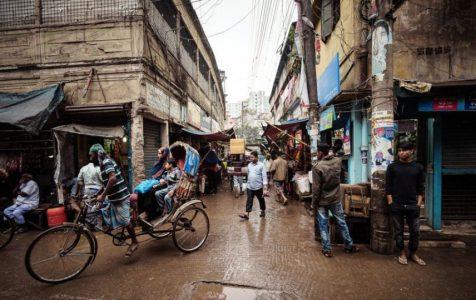
Why Bangladesh is an attractive target for Islamic State and al-Qaeda terrorists?
Since 1971, when East Pakistan broke away from West Pakistan to become an independent state, the Bangladeshi political system has jockeyed between two political parties: the Awami League, currently led by Prime Minister Sheikh Hasina, and the Bangladesh National Party (BNP), led by Khaleda Zia.
The BNP is an ally of Jamaat-e-Islami, an Islamist movement established by the Indian Islamist Abul A’la Maududi in 1941. In 1971, Jamaat-e-Islami opposed Bangladesh’s independence because it rejected the secular, socialist stance that the country’s first President, Sheikh Mujibur Rahman, promoted. Since then, it has become the country’s third-largest political party, although in 2013 it was deregistered, as the Awami League government claimed that Jamaat-e-Islami harbours and supports extremists.
Mohammad A Arafat, a spokesperson of the Awami League, declared and justified the deregistration of Jamaat as a political party on the grounds that “Jamaat is a rabid fundamentalist party which opposed liberation and killed its own people in opposition to freedom. This party should be banned. Their ideology and practices are anti-democratic and anti-secular.”
For anyone concerned with the rise of Islamic extremism in the Asia-Pacific, Bangladesh is a country that can’t be overlooked. In particular, there are several issues that could encourage Bangladeshis to support Salafi jihadism.
The first is the claim by groups such as Jamaat-e-Islami and more militant entities such as al-Qaeda that because Bangladesh allows bloggers and secularists to disseminate their non-Islamic ideas, the country has abandoned Islam. In the case of al-Qaeda, its leader Ayman al-Zawahiri has accused the state of massacring Muslims.
The ruling Awami League has increasingly used the threat of terrorism both to clamp down on dissent and as a means to discredit the opposition.
Earlier this year, Khaleda Zia and her son, Tarique Rahman, were convicted for corruption in what has come to be known as the Zia Orphanage Trust corruption case. Zia received a prison sentence of five years and her son was sentenced to 10 years, after the two were accused of embezzling US $252,000. The BNP has claimed that the trial and the conviction were politically motivated. This is not without some reason, as the government has imprisoned more than 3,000 members of the BNP since February 2018.
The BNP further claims that under Sheikh Hasina, the country’s security authorities have been clamping down on dissent with impunity. There are also accusations that the security forces have engaged in extrajudicial killings, enforced disappearances and torture.
By narrowing the marketplace of ideas and using the security establishment to deal with dissent, the government is laying the foundation for the accusation that the country is heading towards one-party rule.
That’s likely to encourage the opposition to coalesce around the banner of Islam, which could be used to emphasise the corruption in the Awami League, how it exploits its powers to abuse people and how, under a religious party, Bangladesh could become a prosperous egalitarian society.
An additional concern is the Rohingya minority of Burma (Myanmar). Their persecution is linked to former General Ne Win’s policy of Myanmarisation – an ultra-nationalist ideology based on the racial purity of the Burmese ethnicity and its Buddhist faith. The 1982 Citizenship Law robbed the Rohingya of their nationality, effectively making them stateless in their own country.
There are currently around 800,000 Rohingya refugees in Bangladesh, and we know from experience in Pakistan, Somalia and Yemen that refugee camps can become security challenges. Human traffickers, smugglers, and extremists exploit the horrid conditions in the camps with promises of a better future. Both al-Qaeda and Daesh (Islamic State) have shown an interest in using the plight of the Rohingya as a rallying cry, but the Bangladeshi Government has yet to fully acknowledge the presence of foreign jihadists in the country.
Bangladesh has enjoyed a period of sustained economic expansion, growing by over 7.2 per cent last year, which was the third consecutive year of growth over 7 per cent. The benefits of this growth are undermined, however, by claims that the government is only really developing Dhaka. This only encourages migration to the capital as people search for work. It may explain why in 2017, 36 per cent of the country’s urban population were living in Dhaka, making it the world’s most crowded city and one lacking many basic amenities.
This economic change has brought modernisation to Bangladesh, which now has an LGBT magazine and a thriving secular, blog environment. At the same time, modernisation is creating dissatisfaction with existing social, economic and political norms, as well as poor infrastructure, basic services and security.
In this environment, al-Qaeda has sought to present itself as an ally to Bangladeshi political Islamists, whether from Jamaat-e-Islami or other political groups like Hefazat-e-Islam or Islami Chhatra Shibir, in advocating against what is perceived as the secularisation of Bangladesh.
Instead of carrying out terrorist attacks itself, Al-Qaeda has focused on a message to Muslims in Bangladesh and beyond that they are under attack from their government, which is supported by the West. Al-Qaeda leader Ayman al-Zawahiri has claimed: “Bangladesh [is] turning into a huge prison in which the sanctities, honour, dignity and sacred places of Muslims are violated. Their lives are put at stake, and they are tortured in defence of the crusader onslaught, which is fighting Islam politically, militarily and ideologically.”
Daesh, meanwhile, has taken a different approach. Its cadres have carried out numerous, high profile attacks in Bangladesh, from the killing of Cesare Tavella, an Italian aid worker, to an attack on a café frequented by foreigners, in which 20 people died.
Bangladesh faces a multitude of issues that make it highly attractive to al-Qaeda and Daesh, both of which have sought to exploit many of the structural problems that the country faces. We are ignoring Bangladesh at our peril.
Source: Asia Correspondent





